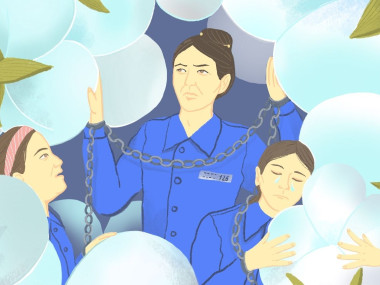China: Researcher explains how Uighurs are exploited in Xinjiang's forced labor regime where Western companies benefit from an opaque system
Uighur activists and human rights defenders often contend that major Western electronics and apparel manufacturers profit from the use of slave-like and coerced labor in China, including work done by Uighurs confined in camps in western Xinjiang Province.
**Rune Steenberg, an anthropologist and researcher at the University of Olomouc in the Czech Republic who has long studied the Uighur population in Xinjiang. **He and his colleagues rely on an approach they call “remote ethnography” to form a picture of what is transpiring in Xinjiang. This method relies on anecdotal evidence from those who have direct experience in Xinjiang, as well as close analysis of written accounts and economic data, to compensate for the lack of access for foreign experts to the region.
This is an interview with Rune Steenberg.
Steenberg: There are three different types of forced or involuntary labor in Xinjiang, each having different degrees of coercion. The most forced and difficult labor occurs in prisons. In Xinjiang prisons, prisoners can be forced to work for decades. Often it is very hard work, physically difficult work in terrible conditions, and no pay, nothing.
Then we have a situation where people are forced to work in the camps, or are transferred from a camp to closed factories, which also operate according to the principles of the camps, where they sew clothes, produce food and various other things. They aren’t paid for this either, but the conditions are not as harsh as in prison.
There are also those who have been interned in a camp but are given an opportunity to move from the camp to a factory. This can be described as “liberation.” All this camp forced labor, as well as prison “slave” labor, takes place in Xinjiang itself, next to the camps and prisons. People who have had a chance to be released from the camp to work in factories are sometimes transferred to inland China. There, they are given a contract, they sign an agreement, and they are paid some kind of salary, albeit a very low one […]
A fourth category is the so-called labor transfer programs. This involves people who have not been arrested or detained. They are directly “recruited” to work in various factories, fields, etc. Some people are sort of forced into it because in their village – or wherever they are – they are told that they need to bring so many people to a certain place, for example, to pick cotton.
[…] when many men are detained in “re-education” camps, their wives, sisters and daughters can be sent to factories in so-called new special economic zones in Kashgar and Ghulja. I’ve heard stories of people who were directly involved, who worked in these newly opened factories. For their work they received a modest salary, but the government, at its own expense, arranged for transport to and from villages. It wasn’t entirely voluntary either – if you didn’t show up or didn’t agree to participate, you could get in trouble.
[…]
[Forced labor] is not used directly by these [Western] companies, but by someone in their supply chains. […] Many of these companies hide behind the fact that they don’t know anything, they just get ready-made products. But the reason why they do this, the benefit they get from it, is that they simply, through forced labor, get very, I repeat, very cheap products.
[…]
China is not just a market economy, but a state-controlled market economy. Therefore, many of these [Western] companies may have been involved in these labor transfer programs. Until companies and factories open up to transparent inspections, we will be forced to suspect that similar forms of forced labor exist throughout the region.
[…]
Our understanding of forced labor needs clarification. Our ideas about it do not quite correspond to the situation in Xinjiang. As I already said, many people there have contracts, they sign up for work, they are paid a salary, but they are under political pressure to go and do the work, and they have no alternative. Therefore, I believe that this could still qualify as forced labor, and maybe even coercion. So, we need to think more deeply about the terms we use and how we define them, as well as the legal framework that surrounds them […]
